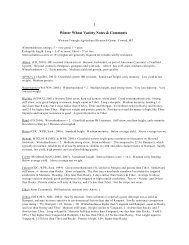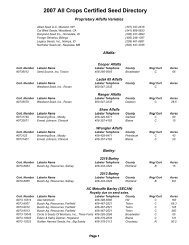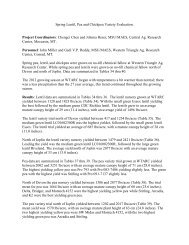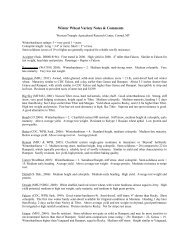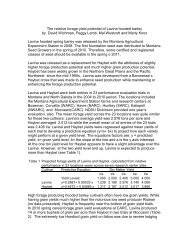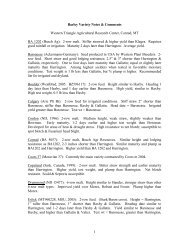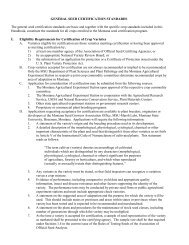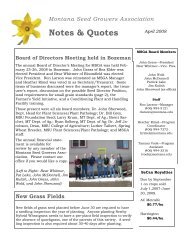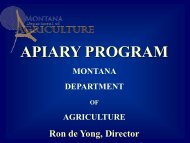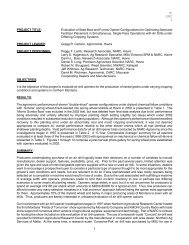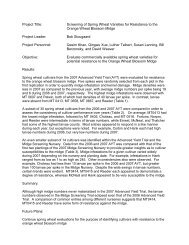Spring 2010 - College of Agriculture - Montana State University
Spring 2010 - College of Agriculture - Montana State University
Spring 2010 - College of Agriculture - Montana State University
Create successful ePaper yourself
Turn your PDF publications into a flip-book with our unique Google optimized e-Paper software.
ResearchResearchers weighthe risks, benefits <strong>of</strong>spraying mosquitoesEvening maneuvers and a mannequin named“Tyvek Man” are involved in MSU research weighingthe risks and benefits <strong>of</strong> spraying mosquitoes.To conduct their field work, Bob Peterson, associatepr<strong>of</strong>essor <strong>of</strong> entomology, and his studentsdrive a pickup truck across an MSU researchfield and release a cloud <strong>of</strong> insecticide. Then theyreturn to the spot to collect dead mosquitoes andinsecticide droplets that landed on the ground oron Tyvek Man’s white overalls.The researchers take their samples to the lab to determinewhether it’s riskier to use a specific pesticide or not to useit, Peterson said. They look at the pesticide’s effect on theenvironment, and the potential impact on water, soil, animals,and people. They also consider the diseases that could spreadif the pesticide isn’t applied.Peterson and his team conduct their field work during summerevenings when adult female mosquitoes are most likelyto fly. That’s generally July and August in <strong>Montana</strong>, and earlytomid- June in California, where Peterson also conductsexperiments. The scientists focus on adult females, becausethey’re the mosquitoes that bite humans and others. In theMSU bakes a better breadFor undergraduates looking for a parttimejob, the Cereal Quality Laboratory(CQL) might be the place to look.“We hire six to nine students a year,”said CQL manager, Deanna Nash. “It’sgreat for them because they get paidwhile learning lab skills and scientificmethods, but they also learn how tobalance work and school.”The CQL cooperates with MSU’swheat breeders, field technicians,research center scientists, and othersto ensure that high quality wheat isreleased and recommended by the <strong>Montana</strong>Agricultural Experiment Station.Additionally, the CQL assists with thedevelopment <strong>of</strong> new markets for <strong>Montana</strong>wheat and other small grains.“MSU’s wheat breeders are improvingwheat varieties. They grow new plantCollin Preftakes with Tyvek man. Photo by Bob Peterson.crosses all over the state,” said Nash. “Inthe fall, they send the harvest samplesto us to test.”Nash and the CQL staff conduct 17,000analyses for protein and moisture levelson the harvested crosses. This ensures thatStudent working in the Cereal QualityLaboratory. Photo by Kelly Gorham.process <strong>of</strong> obtaining blood to nourish their eggs, some <strong>of</strong> themosquitoes transmit diseases like West Nile Virus.MSU researchers in the Biological Risk Assessment programhave analyzed the benefits and risks <strong>of</strong> pesticides for mosquitoessince 2002, Peterson said. That’s when West Nile Virus becamea major public health concern in western North America.The group has found, so far, that the risks from exposureto mosquito insecticides are among the lowest the group hasestimated or observed. If insecticides are used according tothe product label, the risks will remain well within currentlevels <strong>of</strong> concern.“The risks from West Nile Virus are very real and exceedthe risks from exposure to the mosquito insecticides used tocontrol this public health threat,” Peterson said.<strong>Montana</strong> will maintain its reputation forhigh protein and high quality wheat.Using the CQL’s results, MSU’splant breeders can focus on varietiesthat meet these protein and qualitystandards. Advanced varieties are testedagain at CQL.CQL tests the end products <strong>of</strong> thewheat by milling flour and test bakingbreads. They also evaluate noodles,since some <strong>Montana</strong> wheat is sold tothe Asian noodle market.“Every single test we do matters tosomeone along the line: farmers, elevatoroperators, millers and bakers,” Nash said.The tests matter to the student staff, too.“Most <strong>of</strong> the students start as freshmenand continue working here throughgraduation,” Nash said. “It’s nice toknow they enjoy their time at CQL.”5



